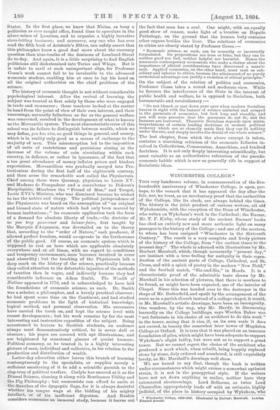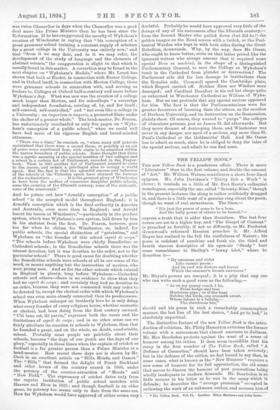WINCHESTER COLLEGE.*
THIS very handsome volume, in commemoration of the five- hundredth anniversary of Winchester College, is open, per- haps, to the remark that it has appeared the day after the fair, not, we trust, as an involuntary proof that the authorities of the College, like its clock, are always behind the times. The history is the joint product of various writers, all old Wykehamists, with the exception of the Dean of Winchester, who writes on Wykeham's work in the Cathedral ; the Bursar, Mr. T. F. Kirby, whose study of the ancient Bursars' books has shed an entirely new and more authentic light on many passages in the history of the College ; and one of the masters, to whom has been assigned "Winchester in the Sixteenth Century." The result is a very complete and lively picture of the history of the College, from "the earliest times to the present day." The whole is adorned with illustrations by Mr. Herbert Marshall, which, though necessarily "present day," are instinct with a true feeling for antiquity in their repro- duction of the ancient parts of College, Cathedral, and St. Cross, and with a spirit of poetry in the modern "New Field," and the football match, "Six-and-Six," in Meads. It is a characteristic proof of the admirable taste shown by Mr. Marshall in his selection of pictures, that there is nowhere to be found, as might have been expected, one of the interior of Chapel. Since this was handed over to the destroyer in the shape of Mr. Butterfield, and spoilt by the arrangement of the seats as in a parish church instead of a college chapel, it would, in Mr. Marshall's artistic drawings, have been an incongruity. One wonders, by the way, why Mr. Hardy, in discoursing learnedly on the College buildings, says Warden Baker was ." not fortunate in his choice of an architect to do this work ". in the tower, seeing that it vies, if, on its own scale it does not exceed, in beauty the somewhat later tower of Magdalen College at Oxford. It is tame that it was placed on an insecure foundation of piles, which might have been adequate to support Wykeham's slight belfry, but were not so to support a great tower. But we cannot regret the choice of the architect who produced a work which, when rebuilt, being happily replaced stone by stone, duly ordered and numbered, is still exquisitely lovely, as Mr. Marshall's drawings well show.
We are bound to say that, though the book is written under circumstances which might excuse a somewhat optimist strain, it is not in the panegyrical style. If the writers have not set down anything in malice, neither have they extenuated shortcomings. Lord Selborne, as twice Lord Chancellor, appropriately leads off with an estimate, highly judicial, of the place in history occupied by Wykeham, who
I• Winchester College, 1338,1893. Illustrated by Herber 4 Marshall. London Edward Arnold, was twice Chancellor in days when the Chancellor was a good deal more like Prime Minister than he has been since the Reformation. If he has exaggerated the novelty of Wykeham'e creation of Winchester in saying that " his conception of a great grammar school training a constant supply of scholars for a great college in the University was entirely new," and that "from it we may date, and to it we may refer, the development of the study of language and the elements of abstract science," the exaggeration is slight to that which is usually found in this matter. A correction may be found in the next chapter on " Wykeham's Models," where Mr. Leach has shown that both at Exeter, in connection with Exeter College, and in Oxford itself, in connection with Merton College, there were grammar schools in connection with, and serving as feeders to, Colleges at Oxford half-a-century and more before Wykeham's day. What was new was the creation of a college much larger than Merton, and for schoolboys "a sovereign and independent foundation, existing of, by, and for itself ; self-centred, self-controlled," and " not even like a college in a University ; an imperium in imperio, a protected State under the shelter of a greater whole." The head-master, Dr. Fearon, has unfortunately vouchsafed us only five pages on "Wyke- ham's conception of a public school," when we could well have had more of his vigorous English and broad-minded utterance.
"There was a time," he reminds us, "when many stiff patriots maintained that there were a sacred three, or possibly as an act of grace some mentioned four, with claim to be admitted within the narrow boundary of public schools. Some thought that there was a mystic meaning in the special mention of two colleges and a school in a certain Act of Parliament, recorded in the Prayer. book. Then in 1861 another Act of Parliament seemed to come to the rescue, and ordain a privileged nine to occupy a world apart. But the fad is that the splendid success and influence of the schools of the Victorian epoch have stormed the fortress
of the exclusionists It is the greatest glory of Winchester to have been the mother of numerous daughter public schools, some the creation of the fifteenth century, some of the sixteenth, some of the nineteenth."
And he points out how "Arnold's conception" of a public school " is the accepted model throughout England; it is Arnold's conception which is the final authority in. America and Australia, even more than in England ; and Arnold learnt his lesson at Winchester,"—particularly in the prmfeet system, which was Wykeham's own system, laid down by him in his statutes from the first. Dr. Fearon, however, goes too far when he claims for Winchester, or, indeed, for public schools, the special distinction of "patriotism," and Wykeham as "the founder of this school esprit de corps." "The schools before Wykeham were chiefly Benedictine or Cathedral schools ; in the Benedictine schools there was the utmost devotion, but it was devotion to the order, not to the particular school." There is good cause for doubting whether the Benedictine schools were schools at all in our sense of the word, or meant anything but the instruction of novices, who were young men. And as for the other schools which existed in England in plenty, long before Wykeham— Cathedral schools and others—there is no evidence to show that they had no esprit de corps ; and certainly they had no devotion to an order, because they were not connected with any order to be devoted to, except the clerical order with which Wykeham's school was even more closely connected than its predecessors. When Wykeham enlarges on brotherly love he is only doing what every founder of every religious house, whether monastic or clerical, had been doing from the first century onward. "Ubi bene eat, j.bi patria," expresses both the cause and the limitations of esprit de corps; and in no other sense can we -fairly attribute its creation in schools to Wykeham, than that he founded a great, and on the whole, no doubt, comfortable, school. Probably most people are patriotic about their schools, because "the days of our youth are the days of our glory," especially in these times when the captain of cricket or football is a far greater person than a Prime Minister or a head-master, How recent these days are is shown by Mr. Cook in an excellent article on "Hills, Meads, and Games." The " Hills " that formed the delight of Frank Buckland and other lovers of the country ceased in 1868, under the potency of the counter-attraction of "Meads" and New Field." The supremacy of cricket dates only from the regular institution of public school matches with Harrow and Eton in 1825; and though football is an older game, its potency too seems only to date from the same era. Bow far Wykeham would have approved of either seems very doubtful. Probably he would have approved very little of the doings of any of his successors after the fifteenth century,— from the Second Master who pulled down (but did he?) the golden images on the Rood screen with a twitch, or the Puri- tanical Warden who kept in with both sides during the Great Rebellion, downwards. Why, by the way, does Mr. Oman, who ought to know better, write on that latter period like the ignorant writers who always assume that it required some special Deus es raachind, in the shape of a distinguished Parliamentary General, to save the College or Wykeham's tomb in the Cathedral from plunder or destruction ? The Parliament side did far less damage to institutions than the Royalist side. Cromwell spared the Cambridge plate, which Rupert carried off. Neither Eton nor Windsor were damaged ; and Cardinal Beaufort in his red hat sleeps quite as unharmed in Winchester Cathedral as William of Wyke- ham. But no one pretends that any special saviour appeared for him, The fact is that the Parliamentarians were far greater favourers of learning than the others, as the erection of Durham University, and its destruction on the Restoration, plainly show. Of course, they wanted to " purge " the colleges of obnoxious persons, just as James IL did afterwards. But they never dreamt of destroying them, and Winchester was never in any danger nor need of a saviour, any more than St. Paul's Cathedral or the Goldsmiths' Hall. And Mr. Oman has to admit as much, since he is obliged to deny the tales of the special saviour, and admit he can find none.



































 Previous page
Previous page